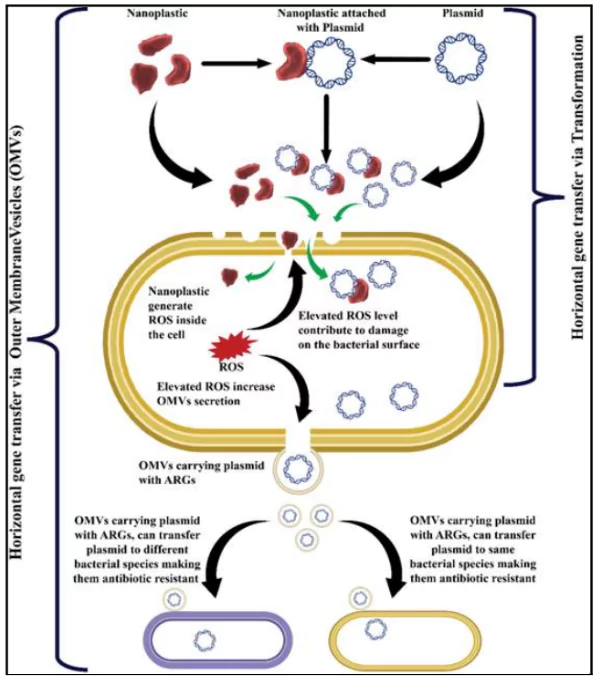A recent study by scientists from the Institute of Nano Science and Technology (INST), Mohali, has demonstrated how nanoplastics can facilitate horizontal gene transfer (HGT) of antibiotic resistance (AR) genes, especially within the human gut microbiota.
About Nano-Plastics
- Nanoplastics are plastic particles smaller than 1 micrometer in size, often generated from the degradation of larger plastic materials due to environmental and mechanical forces.
- Sources of Nano Plastics:
- Single-Use Plastic Bottles (SUPBs): Breakdown of polyethylene terephthalate (PET) bottles.
- Industrial Microplastics: Produced as by-products in various manufacturing processes which further degrade into Nano-Plastics.
- Environmental Degradation: Fragmentation of plastic waste in oceans, soil, and other ecosystems.
- Pathways to the Body
-
- Ingestion: Through contaminated food and water.
- Inhalation: Airborne particles from industrial and urban pollution.
- Dermal Contact: Absorption through the skin during prolonged exposure to plastic-contaminated environments.
|
Key Highlights of the Study
- Impact of Nanoplastics: Polyethylene terephthalate bottle-derived nanoplastics (PBNPs) facilitate the transfer of antibiotic resistance (AR) genes among bacteria, including beneficial gut microbiota like Lactobacillus acidophilus through a process called horizontal gene transfer (HGT).
- Bacteria Involved: Gene transfer from E. coli to Lactobacillus acidophilus highlights cross-species AR gene propagation.
- Risks to Gut Health: Beneficial gut bacteria may act as AR gene reservoirs, potentially transferring resistance to pathogens.
- Call for Action: Emphasis on stricter plastic usage policies and waste management to mitigate risks to human microbiome health.
Check Out UPSC Modules From PW Store
Impact of Nano-Plastics on Cellular Level

- Oxidative Stress: Induces reactive oxygen species (ROS), leading to cellular damage which triggers stress-response genes in bacteria.
- Membrane Damage: Causes physical damage to bacterial membranes and facilitates the secretion of outer membrane vesicles (OMVs), enhancing gene transfer potential.
- Gene Transfer Facilitation through two pathways:
-
- Direct Transformation Pathway: Nanoplastics act as carriers for AR plasmids, promoting direct gene transfer between bacteria.
- OMV-Induced Pathway: Nanoplastics enhance OMV secretion, which carries AR genes across species.
Antimicrobial Resistance (AMR)
- Antimicrobial resistance occurs when microorganisms develop mechanisms to survive exposure to antibiotics, rendering treatments ineffective. It is a critical global health threat.
- Drivers of AMR:
- Overuse and misuse of antibiotics in humans and livestock.
- Environmental contamination with antibiotics and resistant bacteria.
- Impact on Public Health:
- Reduced efficacy of antibiotics.
- Increased prevalence of multidrug-resistant infections.
- Higher healthcare costs and mortality rates.Findings from INST Study
![]() 20 Dec 2024
20 Dec 2024


